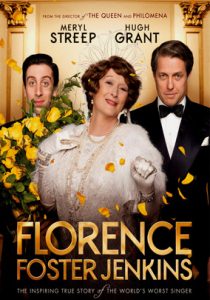Florence Foster Jenkins-2016
Director Stephen Frears
Starring Meryl Streep, Hugh Grant
Scott’s Review #613
Reviewed January 30, 2017
Grade: B
Director Stephen Frears loves to direct films starring vehicles for mature actresses. Judi Dench, Helen Mirren, and Meryl Streep have benefited vastly from his direction (all received Oscar nominations).
In Florence Foster Jenkins (2016), Frears crafts a warm-hearted tale about a famous real-life opera singer, the title character of whom is played by Meryl Streep.
The film is likable but not up to par with other Frears’ gems, specifically Philomena (2013) or The Queen (2006).
Given the subject matter, the film is too safe for my tastes and should have been darker.
Florence Foster Jenkins was a New York City socialite and heiress who flourished in 1944. She founded the Verdi Club and did a great deal of good for music, specifically opera, which she adored.
Her husband, Bayfield, played by Hugh Grant, nicknames her “Bunny.” He reveres her, but not physically—he resides elsewhere with a girlfriend.
This is due to Bunny being afflicted with long-term syphilis, causing her to be medicated and rendering her bald and unable to engage in sexual relations.
Bunny is a wretched, flat singer; despite her passion for singing, everyone convinces her how wonderful she is because she is so well-regarded in her social circle. Many people are paid off in exchange for their support.
Due to Bunny’s medication, it is assumed that she cannot hear properly, leaving her unaware of how badly she sings. Bunny is now determined to sing at Carnegie Hall, and Bayfield must scramble to make sure no critics are anywhere in sight for the big show, saving his wife from humiliation.
Any film starring Meryl Streep is assured to be fantastic from an acting standpoint, and, per usual, she does not disappoint. Streep envelopes the role of Bunny, giving her charm and a vulnerability that only Streep can do.
Although the character knows what she wants and is stubborn, she is also kind, and we see passion oozing from her pores.
Streep is the highlight and the draw of the film.
Hugh Grant deserves kudos, and I liked the chemistry between the two actors. Although seeking physical relations with another woman may make him appear a cad, Grant also gives Bayfield sensitivity and genuine care for his wife.
They have “an arrangement,” but he hides his girlfriend when Bunny shows up unexpectedly, not wanting Bunny to be embarrassed.
Grant’s and Streep’s scenes together are tender and believable.
Like Bunny’s pianist, McMoon, Simon Helberg also positively influences the film. Hired to accompany Bunny’s singing, he is initially appalled and bemused but finally understands Bunny, coming to love and respect her for who she is.
The character is clearly gay (the film never comes out and says this), but gay themes are common in Frears films, and it is a non-issue among the principal characters, excellent, but perhaps unrealistic for that time.
A flaw of the film is the lack of any purely great moments. I suppose the climax at Carnegie Hall should have been it, but I did not wholly buy the entire film.
Even the crowd’s laughter and mocking of Bunny seem to be done in a soft, light way.
Nonetheless, Florence Foster Jenkins (2016) is a decent offering, and Streep is the ultimate selling point.
The costumes are also great.
Oscar Nominations: Best Actress-Meryl Streep, Best Costume Design

